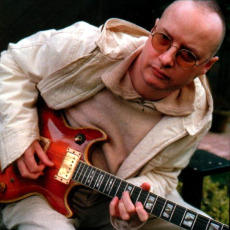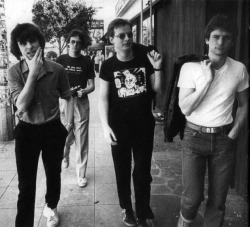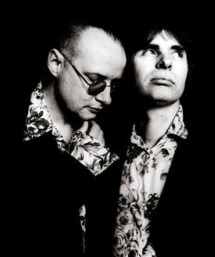XTC's Psych Side Project Gets an Acid Flashback
by Paul Myers • October 14, 2009
 First, the bad news.
First, the bad news.
“At this point,” announces Andy Partridge over the phone from his Swindon, England home, “XTC is pretty much a memory, I'm afraid. I don't think it's ever going to be a going concern again. I certainly have a dislike of older bands that re-form; they really, really shouldn't do it.”
For fans of the legendary British post-new wave group—who managed to survive a good 20 years longer than most of their contemporaries, with the possible exception of REM—this news comes not so much as a shock but rather a grim confirmation of the end of an era. Yet, as Partridge continues, it becomes clear that, while XTC the band may be strictly a historical concern, XTC the brand is in the middle of one of its busiest years in quite some time.
Since the departure of guitarist Dave Gregory in the spring of 1998, the band had been largely an in-name-only affair anyway, a team moniker shared by Partridge and Colin Moulding, who had long been the sole songwriters in the band. After leaving their long-standing, and some would say long-suffering, label, Virgin Records, at the dawn of the new millennium, the pair managed to turn out two more XTC records, Apple Venus Volume 1 and Wasp Star (Apple Venus Volume 2) on their own label, Idea Records. Continuing legal strife between the remaining duo and Virgin, however, has kept most of the band's back catalog on ice for the past decade.
According to Partridge, however, most of XTC's Virgin Records releases will get proper reissues—possibly by year's end—with fan-friendly bonus tracks, liner notes, and remastering.
“They're doing an expanded English Settlement,” Partridge reveals, “which will be the two discs on one CD, and on another CD will be all the associated tracks from that era, like ‘Tissue Tigers’, ‘Blame the Weather’, ‘Heaven Is Paved with Broken Glass’, and all that stuff that escaped on B-sides or EPs or whatever. So we'll master it really well and hopefully we'll get to do good sleeve notes and stuff, although I should say that we're not in control of the budget because this is still Virgin putting it out.”
It seems that, while Partridge remains engulfed in the flames of optimism, he's nonetheless wary of being burned yet again by what he feels has been a depressing history with his former corporate masters.
“Virgin mishandled an earlier remaster series,” says Partridge, “and there were all sorts of bad color separations and misspellings and wrong track listings. It was really heartbreaking. They've actually fumbled the ball, radically, twice in recent years. During the whole Britpop thing, they didn't promote our back catalog despite all these bands like Blur, Pulp, and countless others that, to me, were shamelessly attempting to sounds rather like us. Then it came around again a few years later with another wave of bands like Dogs Die in Hot Cars, Hot Hot Heat, Franz Ferdinand, Maxïmo Park, the Futureheads, and Bloc Party. Everybody would come up to me in the street and say, ‘Hey Andy, that band blah blah sounds just like what you did in 1979!’ So Virgin fumbled it yet again, when they should have been promoting our back catalog there.”
News of the imminent XTC reissues was somewhat upstaged, however, by the recent release of two new self-reissues from XTC's psychedelic alter-ego group, the Dukes of Stratosphear, on Partridge's own Ape label.
“We got the crumbs off the table,” says Partridge of Ape's arrangement to retain certain XTC side projects. “We got use of the Dukes and, I think, Rag & Bone Buffet, The Dub Experiments, and something else I can't remember. And, of course, Ape will be putting out the vinyl versions, so if Virgin won't do proper sleeve notes [for their CD reissues] we'll just pack the vinyl releases with all that stuff.”
The Dukes grew, like much of XTC, out of Partridge's love of the records from his childhood in the '60s, a time of heavy experiments mixed with childish novelty songs. Partridge, in fact, makes no distinction between the two.
“Psychedelia is novelty songs for adults,” he says of the tripped-out records of his youth. “It was a time when people were looking for new ways to screw up the sounds and make them more dreamlike. Ultimately, there was very little progressive about it; they were mostly using effects that had been used before, but just laying it on thicker. Things like echo chambers, phase shifting, and experiments with stereo panning. ‘What happens if I move the pan control? Oh wow, it seems to be moving through your head!’ The psychedelic people were dreaming up new ways to sort of floss your head out. But if you compare the wackiest novelty records with the straightest, most government-approved psychedelia of '67-'68, you'll see there's not that much difference. One is supposedly counterculture for the rebellious pot-smoking youth, and the other one is for respectable little kids, or funny stuff for children.”
Partridge cites a few key records as the genesis of the Dukes’ sound. The ominous intro of Pink Floyd's “See Emily Play”, the reverse throb of Tomorrow's “My White Bicycle”, and what he terms “the sonic murk mud mystery” of “We Are the Moles” by, of course, the Moles. The teenage Partridge was so captivated by these records that he assumed he would be in a psych band when he grew up.
“In between,” adds Partridge, laughing, “my duties as a policeman, of course.”
While the Dukes of Stratosphear trafficked in a predominantly British brand of psychedelia, songs like “You're My Drug” approach the sunshine splendor of Californian tripsters like the Byrds. Partridge, the aficionado, explains the differences between the strains.
“For one,” says Partridge, “the UK never had Vietnam. The only decent thing that ['60s British Prime Minister] Harold Wilson ever did was to refuse to go into Vietnam. So we didn't have to worry about being  drafted and going to war. Also, in Britain in 1967, Victoria was still alive in the minds and attitudes of a lot of people. There were boutiques like Granny Takes a Trip and the like, so we still had this Victorian hangover of Lewis Carroll and Edward Lear, sort of etched on the wallpaper. The English side is much more nursery rhyme and the American side is a bit more serious drugs and draft card-burning… a more desert-baked and hard-edged thing with more violence to it.”
drafted and going to war. Also, in Britain in 1967, Victoria was still alive in the minds and attitudes of a lot of people. There were boutiques like Granny Takes a Trip and the like, so we still had this Victorian hangover of Lewis Carroll and Edward Lear, sort of etched on the wallpaper. The English side is much more nursery rhyme and the American side is a bit more serious drugs and draft card-burning… a more desert-baked and hard-edged thing with more violence to it.”
While the fictitious group's introductory EP 25 O'Clock (1985) and its full-length follow-up album Psonic Psunspot (1987) were previously reissued by Virgin in 2001 as a single CD entitled Chips from the Chocolate Fireball, the Ape reissues return them to two separate, remastered products.
“Legally, we couldn't put it out as Chips from the Chocolate Fireball,” admits Partridge, “because that was a Virgin release, so we had to break it back up into two Dukes projects. The trouble then was that 25 O'Clock looked a darn sight shorter than the other, so that was the one that got the majority of the extra material—the stuff from the vaults.”
The bonus tracks with 25 O'Clock now include demos for “Bike Ride to the Moon”, “My Love Explodes”, “What in the World??...”, and the title track, plus two rare demos for never-released songs, “Nicely Nicely Jane” and “Susan Revolving”, plus unreleased studio masters of “Black Jewelled Serpent of Sound [Radio Caroline Edit]”, “Open a Can of Human Beans”, and “Tin Toy Clockwork Train.” Psonic Psunspot offers an original demo for “Vanishing Girl”, originally titled “No One at Home”, along with those for “Little Lighthouse”, “Collideascope”, “Shiny Cage”, “Brainiac's Daughter”, and “The Affiliated.”
Partridge insists that, as a fan himself, it was “essential” to add such extras.
“If people are expecting you to buy the same thing, again,” he explains, “it's got to be a hell of a lot better than the original issue. We couldn't do it this well at Virgin, because they wouldn't have put it out in a little book with all those notes, and we managed to get it remastered. I think it sounds better than the original master. It was done with better quality gear and someone who's more conscientious about that sort of thing—and also, putting all the extra tracks in, which we had languishing in the wardrobe. Two of them I had to get back from a fan! I had actually sent a cassette, years ago, with ‘Nicely Nicely Jane’ and ‘Susan Revolving’ to a fan/friend of mine. I'd said, ‘Here, I won't need these!’ So I had to beg them back from him last year. It wasn't a multi-track recording, just me singing into a cassette machine. I think if we hadn't done ‘The Mole from the Ministry’, the next thing to come up would have been ‘Susan Revolving.'”
Besides the value-added extra tracks, Partridge is most proud of the packaging for the re-releases, which now come in shiny, hardback, book-like gatefold jackets with detailed personal liner notes by Partridge and his erstwhile estranged bandmates. Gregory submits Stratosgear: How the Sounds Were Found (parts 1 & 2), Moulding and Partridge write about their memories of the sessions, while Partridge even adds notes about the cover art for each respective release. The band also sells a set of six lapel buttons from the Ape website.
 “I can't talk enough about packaging,” says Partridge, “in many ways, that's my big love. I could actually put out albums that were just packaging with nothing on the disc! I don't think the music's important, I seriously don't. At one time, I had a whole collection of album sleeves with no albums. I was only interested in the artwork.”
“I can't talk enough about packaging,” says Partridge, “in many ways, that's my big love. I could actually put out albums that were just packaging with nothing on the disc! I don't think the music's important, I seriously don't. At one time, I had a whole collection of album sleeves with no albums. I was only interested in the artwork.”
That said, the music on the discs, produced by John Leckie (XTC, Stone Roses, etc.), signaled XTC's increasingly psychedelic shift at the time. As the Dukes, the members of XTC each assumed psychedelic pseudonyms. Thus, Partridge was known as “Sir John Johns,” Moulding became “The Red Curtain,” Gregory traded as “Lord Cornelius Plum,” while his brother Ian Gregory (brought in to play drums) became “E.I.E.I. Owen.”
While Partridge says that the side project initially gave XTC “permission to be someone else,” the mind-expanding elements of the Dukes sound soon insinuated themselves into XTC proper.
“Originally,” he admits, “it was just a device, like the Beatles did with Sgt. Pepper. They were sort of bunged up as the Beatles and needed to call themselves another group in order to feel free enough to try some things out. Just as Ringo became ‘Billy Shears,’ I became ‘Sir John Johns.’ Literally, dozens of people have explored that whole idea of secret albums done under assumed names. Zappa did [Cruising with] Ruben & the Jets, Roy Wood did [Introducing] Eddy and the Falcons, the Beach Boys were "Carl and the Passions," and Stevie Wonder even did that instrumental album as "Eivets Rednow"—his name backwards!”
By the time XTC were working on Skylarking with Todd Rundgren, they had fully digested—or ingested—the Dukes into their bloodstream.
“Skylarking,” says Partridge today, “is the great missing Dukes album, just as I think that 25 O'Clock and Psonic Psunspot are the great missing XTC albums. If you look back at XTC's progress, you can already hear the mellotron and backwards guitars on Mummer. The signposts were going up, ‘This is where they're going, folks!’ There was a little detour with some of the things on The Big Express, but by the time Big Express was being mixed, I was already writing material that I really wanted to do with the Dukes. It just seemed the inevitable place to go. Now, in hindsight, it doesn't seem like a detour at all, although it did at the time. In time, the Dukes stopped being barnacles on the ass of XTC and just became another limb, really. By the time of the Oranges and Lemons cover art, we were kind of saying, ‘Hey, we don't have to do this jokingly; we can really do this stuff if we want!'”
